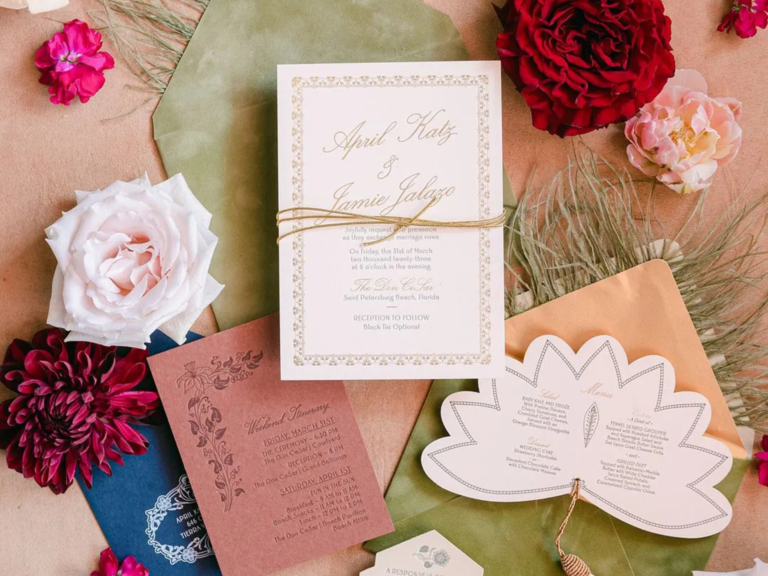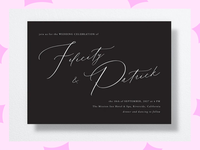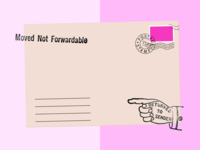How to Understand Your Wedding Stationery Contract
If you're in the process of deciding on the invitations for your upcoming nuptials, you likely are encountering your first wedding stationery contract. Once you begin working with a stationer, this contract will be drawn up to lay out the timeline, pricing and deliverables from your vendor. These wedding stationery contracts aren't too difficult to understand, yet it's important to know the details that should be included within this document.
Of course, before you sign any stationery contracts, you need to find a stationer for your various paper goods. The Knot Vendor Marketplace is a great place to start. You can easily search by your location and then sort by "invitations and paper goods" to see options in your area. Another solution? The Knot Paper allows you to customize your invitations and day-of paper to fit a number of themes and styles.
Once you have your perfect wedding stationery vendor in place, read ahead to understand all the details you need in a wedding vendor contract, according to a lawyer.
1. General Information
"Your contract with your stationer absolutely has to cover the basics—what the stationer is designing and printing for you (and in what quantities), how much everything costs, and general timing for the project," explains Leah Weinberg, an attorney at Weinberg Legal and a former wedding planner. It's best for your contract to have multiple sections that break things down into pricing, timeline, delivery and other policies.
2. Pricing and Fees
The pricing section of your contract should clearly state the cost of goods and services that you and the stationer agreed to. This section can also include additional fees that may arise for reprints, revisions outside of your agreed amount or other policies that the stationer may have in place. Get familiar with the average wedding invitation costs before hiring your stationer.
3. Outline of the Stationery Process
Transparency with your wedding vendors is key. That's why having the process laid out in detail within your wedding invitation contract is extremely helpful so you can hold proper expectations for the timeline and finished product. "Where I see a lot of client relationships go awry when it comes to stationery is with regard to the stationer's process," Weinberg explains. "I encourage you to have your stationer outline their process in detail in your agreement." She says this written process should include what a stationer needs from you to get started and a deadline for your deliverables. The custom stationery contract should also lay out when you can expect an initial draft, how long you have to provide feedback or approval, how quickly the stationer has to provide revisions, and how many rounds of revisions you get.



Weinberg emphasizes that going into the details of your wedding invitation suite checklist and this timeline is vital to give you and your stationer the proper tools to make your order go off without a hitch. "The process is so ripe for challenges because any delays from either party can result in missed deadlines, rushed fees and unnecessary stress. Make sure you understand what your responsibilities are (and the timing of them) and the same of your stationer," Weinberg notes. "When everyone is contractually obligated to perform when it comes to substance and timing, it tends to make the process much smoother."
4. Delivery
Your custom wedding invitation contract should clearly state the terms and timeline for when your paper goods will ultimately be delivered to you. This can also include details on where you can receive the stationery. For instance, you can have it detailed in the contract that the product will be mailed to you or that you will pick it up in person.
5. Cancellation or Rescheduling Details
While it's very unlikely that your wedding date will change or get canceled, it's best to be prepared in case it occurs. "Make sure that your contract with your stationer details what happens if you have to reschedule or cancel your wedding," Weinberg says. "As an FYI, your stationer probably won't have a lot of flexibility on what their policies are, but it's incredibly important that you at least know in advance what will happen in one of those unfortunate scenarios."
6. What's Not in the Contract
While you absolutely will be able to enforce the stationery designer contract to get your beautiful wedding invitations, Weinberg notes that the company won't be beholden to two important things. The first is typos in your wedding invitation wording. "Your stationer is your designer—not your copy editor. All stationers are going to have a step in their process where they send you a final proof to approve before sending things off to print. This is your opportunity to catch any spelling or other errors in the copy." She continues, "Because of this, I always suggest that you have at least one or two other people also review the copy before everything goes to print. If things get printed and you catch a typo after the fact (assuming the typo was on the version you approved), unfortunately, you'll have to pay for the reprinting costs."
Second, your stationer won't be liable for any wedding invitations that get lost on the way to your guests via the US Postal Service. Weinberg says, "Whether it's a save-the-date or invitation getting lost in the mail or items taking unusually long to reach their destination, your stationer will never be responsible for that."





















